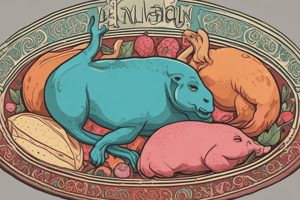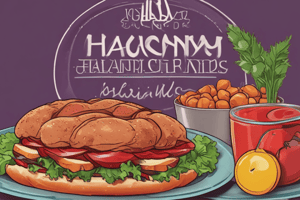Podcast
Questions and Answers
What is a critical requirement for an animal to be considered halal?
What is a critical requirement for an animal to be considered halal?
- The animal must be slaughtered without any blessings.
- The animal must be properly slaughtered with the tasmiyah and takbir blessings. (correct)
- The animal must be killed by a machine.
- The animal can be eaten if it dies naturally.
Which of the following practices is deemed unacceptable during halal slaughtering?
Which of the following practices is deemed unacceptable during halal slaughtering?
- Recording blessings beforehand for later use. (correct)
- Supervising the slaughter by an experienced Muslim.
- Saying a blessing in person at the moment of slaughter.
- Using a sharp knife to make quick cuts.
What role must individuals designated as inspectors or supervisors in halal slaughtering possess?
What role must individuals designated as inspectors or supervisors in halal slaughtering possess?
- They must have experience in non-halal slaughtering practices.
- They should not require any specific qualifications.
- They must have a business background to manage the slaughtering effectively.
- They must have formal education and experience in halal procedures. (correct)
What should a producer do to verify that a meat product is authentically halal?
What should a producer do to verify that a meat product is authentically halal?
Why might some producers incorrectly label meat as halal?
Why might some producers incorrectly label meat as halal?
What type of alcohol is prohibited in halal food preparations?
What type of alcohol is prohibited in halal food preparations?
Which ingredient is generally permitted in halal food despite being a by-product of alcohol?
Which ingredient is generally permitted in halal food despite being a by-product of alcohol?
What must be ensured about fats used in halal food?
What must be ensured about fats used in halal food?
Why should caution be exercised with prepared foods?
Why should caution be exercised with prepared foods?
What type of processing aids should not be used in vegetable-based oils for halal compliance?
What type of processing aids should not be used in vegetable-based oils for halal compliance?
Which of the following is a concern regarding hidden ingredients in bakery goods?
Which of the following is a concern regarding hidden ingredients in bakery goods?
What responsibility does the producer have regarding halal regulations?
What responsibility does the producer have regarding halal regulations?
What is required for halal-certified products containing meat?
What is required for halal-certified products containing meat?
What must be done before a plant that usually produces non-halal products commences halal production?
What must be done before a plant that usually produces non-halal products commences halal production?
Why is extra Muslim supervision necessary for halal certification of prepared foods?
Why is extra Muslim supervision necessary for halal certification of prepared foods?
What role do supervisory organizations play in halal certification?
What role do supervisory organizations play in halal certification?
What might the use of stearates in packaging indicate?
What might the use of stearates in packaging indicate?
What evaluation method might be used to determine the halal status of packaging materials?
What evaluation method might be used to determine the halal status of packaging materials?
What characteristics should reputable supervising organizations exhibit?
What characteristics should reputable supervising organizations exhibit?
What might consumers rely upon to determine the halal status of products?
What might consumers rely upon to determine the halal status of products?
What is the responsibility of the producer in regards to halal regulations?
What is the responsibility of the producer in regards to halal regulations?
What is required for a facility to receive halal certification?
What is required for a facility to receive halal certification?
What must be reviewed and approved by the Muslim supervisory organization for halal certification?
What must be reviewed and approved by the Muslim supervisory organization for halal certification?
Which of the following is NOT part of maintaining halal certification?
Which of the following is NOT part of maintaining halal certification?
What must be present during all phases of halal slaughtering?
What must be present during all phases of halal slaughtering?
How should changes in suppliers or ingredients be handled during the certification period?
How should changes in suppliers or ingredients be handled during the certification period?
What is required for slaughterhouses that are not exclusively halal facilities?
What is required for slaughterhouses that are not exclusively halal facilities?
What documentation should be maintained by a Muslim supervisory organization?
What documentation should be maintained by a Muslim supervisory organization?
What is considered a complex product in halal certification?
What is considered a complex product in halal certification?
What type of inspection may the Muslim supervisory organization conduct?
What type of inspection may the Muslim supervisory organization conduct?
Flashcards
Halal Slaughter
Halal Slaughter
The act of slaughtering an animal in accordance with Islamic law, ensuring minimal suffering and proper blessings.
Tasmiyah and Takbir
Tasmiyah and Takbir
A specific prayer recited during halal slaughter, symbolizing gratitude and respect for the animal's life.
Slaughterman
Slaughterman
A trained Muslim individual responsible for performing the halal slaughter.
Halal Cut
Halal Cut
Signup and view all the flashcards
Halal Certificate
Halal Certificate
Signup and view all the flashcards
Halal Concerns in Bakery Goods
Halal Concerns in Bakery Goods
Signup and view all the flashcards
Halal Additives & Preservatives
Halal Additives & Preservatives
Signup and view all the flashcards
Prohibition of Alcohol in Halal Foods
Prohibition of Alcohol in Halal Foods
Signup and view all the flashcards
Vinegar in Halal Foods
Vinegar in Halal Foods
Signup and view all the flashcards
Halal Verification for Prepared Foods
Halal Verification for Prepared Foods
Signup and view all the flashcards
Producer Responsibility for Halal Compliance
Producer Responsibility for Halal Compliance
Signup and view all the flashcards
Halal Production in Multi-Purpose Facilities
Halal Production in Multi-Purpose Facilities
Signup and view all the flashcards
Packaging Material Halal Certification
Packaging Material Halal Certification
Signup and view all the flashcards
Halal Status of Plastics
Halal Status of Plastics
Signup and view all the flashcards
Halal Status of Metal Cans
Halal Status of Metal Cans
Signup and view all the flashcards
Melt-Down Test for Packaging
Melt-Down Test for Packaging
Signup and view all the flashcards
Approved Halal Packaging
Approved Halal Packaging
Signup and view all the flashcards
Supervisory Halal Organizations
Supervisory Halal Organizations
Signup and view all the flashcards
Importance of Halal Organization Reputation
Importance of Halal Organization Reputation
Signup and view all the flashcards
Halal Certification for Export
Halal Certification for Export
Signup and view all the flashcards
Halal Facility Approval Criteria
Halal Facility Approval Criteria
Signup and view all the flashcards
Halal Facility Inspection
Halal Facility Inspection
Signup and view all the flashcards
Halal Ingredient Approval
Halal Ingredient Approval
Signup and view all the flashcards
Separate Halal Procedures
Separate Halal Procedures
Signup and view all the flashcards
Halal Logo and Name Usage
Halal Logo and Name Usage
Signup and view all the flashcards
Unannounced Inspections
Unannounced Inspections
Signup and view all the flashcards
Halal Facility Sanitation
Halal Facility Sanitation
Signup and view all the flashcards
Complex Halal Production
Complex Halal Production
Signup and view all the flashcards
Mixed Halal Production
Mixed Halal Production
Signup and view all the flashcards
Study Notes
Halal Industrial Production Standards
- This document outlines standards for halal food production
- Published by J&M Food Products Company in January 2000, in Illinois, USA
- Authored by Dr. Muhammad Munir Chaudry, Mohammad Mazhar Hussaini, Mary Anne Jackson, and Dr. Mian Nadeem Riaz
- The goal of halal supervision is to ensure food is "proper and permitted" according to Islamic principles (halal)
Introduction- The Goal and Purpose of Halal Supervision
- Halal means "proper and permitted"
- Dhabiha Halal refers to the appropriate slaughter of meat and poultry
- Haram means "prohibited" or "forbidden"
- Products not produced using halal standards are prohibited for consumption, just like alcohol or pork
Halal Supervision and Inspection
- Qualifications for inspectors and supervisors include demonstrated practical knowledge of food preparation and adherence to Islamic practices
- Training of inspectors and supervisors is provided by accredited organizations, including on-site and off-site programs, which cover halal requirements and practices
- The supervising organization is responsible for evaluating the inspectors and supervisors' knowledge
Meat and Poultry
- Specific animal species are acceptable for halal consumption
- Slaughtering practices must be humane and spiritual, with blessings said over the animal before slaughter
- Detailed instructions on procedures used during each process
- Unacceptable practices are clearly outlined
Fish and Seafood
- Species acceptable for halal consumption are outlined
- Slaughtering practices specific to fish and seafood are discussed, without harming the fish and ensuring no suffering
- Standards and requirements for supervisors and inspectors handling fish and seafood production are highlighted
Milk and Dairy Products
- Halal standards for specific dairy products like yogurt and cheese are described
- Proper handling of milk and dairy products are detailed, according to Islamic principles
Fruits and Vegetables
- All fresh fruits and vegetables are considered halal
- Processed fruits and vegetables are considered acceptable if made and produced according to halal practices and guidelines
Bread, Breading, Pastries, Cakes
- Halal standards for these items are detailed
- Procedures must ensure halal status
Oils and Fats
- Fats must come from halal-slaughtered animals
- Preservatives or processing aids cannot contain alcohol
Additives, Colorants, Preservatives
- Additives, colorants, and preservatives must come from acceptable sources
- Alcoholic-based carriers should be avoided
Alcohol and Alcohol By-Products
- Alcohol and alcohol-based ingredients are prohibited
Prepared Foods- Complex and Multiple Ingredients
- Halal supervision and participation is required during production when preparing prepared foods with multiple ingredients
Packaging Materials
- Halal guidelines for packaging materials, including plastic and metal containers are outlined
- Material sourcing must be examined and approved to ensure there is no alcohol or animal derivate use in the material
Reliance Upon Reputable, Well-Known and Respected Supervising Organizations
- The halal certification process and standards are outlined, to ensure adherence to Islamic standards
- Organizations producing halal products need supervision and the supervision standards must be checked and verified
Guidelines and Standards for Producers
- Detail of the certification process for products or companies
- Procedures needed to prove ingredients are indeed halal
- Specifications for preparation, documentation, shipping, storage, and labeling are shown
- The producers must comply with regulations and standards set by the supervisors
Species Acceptable (halal) for Consumption
- Suitable animals for consumption and their origins
- Species that are not acceptable (haram)' and the reasons for their prohibition
- The regulations concerning animals slaughtered by other religions
Slaughtering Practices- A Humane and Spiritual Process
- Slaughter methods and procedures must adhere to Islamic principles, minimizing pain and suffering
- Detailed procedures and considerations during the slaughter process for humane practices, which will ensure a minimum of suffering to the animal, are detailed
Requirements for Inspectors, Supervisors, and Slaughtermen
- Roles and responsibilities of supervisors, inspectors, and slaughtermen
- Necessary knowledge and skills are required
- Training requirements and expertise needed for supervisors and inspectors
Acceptance of Meat Slaughtered by Jews or Christians
- Meat slaughtered by Jews or Christians may be consumed but is not preferred
- Halal meat is the best option
Additional Requirements for Plants Using Pork, Lard, Pork-derived Ingredients for Non-halal products
- Guidelines for separating pork and non-pork products in facilities
- Procedures for cleaning equipment to prevent contamination
- Separations of halal and haram products
Labeling Requirements
- Labeling requirements are specified and must follow guidelines
- Supervisory organization's name and/or symbol must be appropriately displayed
Inspection and Approval of Plant and Production Processes
- Procedures and guidelines for plant approval are specified
- Ingredient and ingredient supplier requirements
Studying That Suits You
Use AI to generate personalized quizzes and flashcards to suit your learning preferences.




